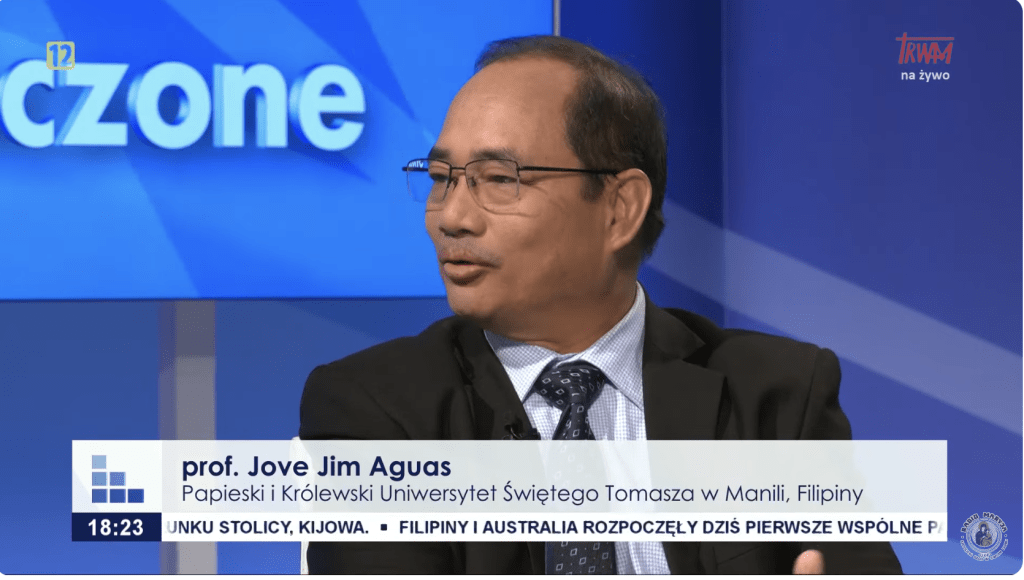Prof. Jove Jim S. Aguas, Ph.D., of the Center for Theology, Religious Studies, and Ethics, and the Philosophy Department presented a paper during the 16th International Congress held in Toruń, Poland, from November 24 to 25, 2023. The International Congress, “Catholics and Corporeality,” encouraged deep reflection on the relationship between the Catholic faith and human nature, body and spirit.

The conference was organized by the Academy of Social and Media Culture (AKSiM) in Toruń, the Regional Center for International Debate in Toruń, the Department of Philosophy of Culture and Foundations of Rhetoric of the John Paul II Catholic University of Lublin, and the “Memory and Identity” Institute – Saint John Paul II. It was held in the AKSiM auditorium at Droga Starotoruńska 3, 87-100 Toruń and broadcast on TRWAM TV and Radio Maryja, Poland.
Aguas delivered his paper titled “Karol Wojtyła‘s Notion of the Body: Corporeality and Human Sexuality” on the first session of the conference. Present during the session were His Eminence Cardinal Gerhard Ludwig Müller, former Prefect of the Congregation for the Doctrine of the Faith; Prof. Fr. Marcin Kowalski, professor at the John Paul II Catholic University of Lublin, a member of the Pontifical Biblical Commission; and Prof. Fr. Jarosław Merecki, SDS of the John Paul II Institute for the Sciences of Marriage and Family.
Aguas focused on Karol Wojtyła’s (later known as Saint Pope John Paul II) concept of the body, human corporeality, and sexuality. He stressed that the human body is the basis of biological, health, social, cultural, and religious issues. It can be both a blessing and a curse for a person. However, as Karol Wojtyła taught, regardless of the perspective adopted, the body is part of personal identity and has value and dignity.
According to Aguas, the human body is of particular interest to Karol Wojtyła, who considers the body to be part of the psychosomatic unity of the human person as the body manifests the somatic constitution of man and forms the basis of man’s affinity with nature. Even in his later writings as Pope John Paul II, he emphasizes that man must be understood as corporeal and that the basis of being male and female is a man’s corporeality. Aguas further shed light on the proper understanding of the human body and dispelled the notion that the body is a source of corruption and that it is just an object that can be used or manipulated for whatever purpose. He concluded that Wojtyla’s understanding of the dignity of the human body is anchored on Christian teachings and traditions and justifies the Catholic belief that, indeed, the body is the “temple of the Holy Spirit.”
Aguas’s travel is part of the Staff Mobility for Teaching Mobility Agreement under the Erasmus+ Program between the University of Santo Tomas and the University of Social and Media Culture in Toruń, Poland.
During his stay in Toruń, he also guested in the television program Unfinished Conversations: Catholics and Corporeality on TRAWM TV and Radio Maryja. He also traveled to Lublin and visited the John Paul II Catholic University of Lublin (KUL) to explore a possible academic linkage between UST and KUL.




